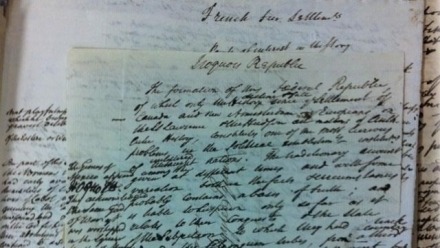The subject of my paper is an ambiguous figure whose career illustrates the perils, as well as the promise, entailed in the attempt to write a genuinely colonial history of America from within the intellectual heartland of Scotland’s Enlightenment. The Reverend Professor Andrew Brown (1763-1834) attempted what no other Scottish scholar of his generation sought to do. He attempted to write a history of America as a genuinely colonial history – one that placed the colonisation of the First Nations peoples at the centre of his narrative. Brown did not shirk or evade the moral burden of empire, he readily acknowledged the deliberate infliction of suffering on colonised populations. Despite his best intentions however, Brown’s ambitious and morally distinctive project was never brought to completion. Now all that remains of it are several boxes of all but indecipherable literary fragments, from which I will argue, there is still much to be gleaned by intellectual historians of Scotland’s Enlightenment and its entanglements with empire and colonization.
Confronting the remains of Brown’s archive also poses some challenges for intellectual historians. The challenge is not primarily about trying to extract the outlines of a coherent history from disordered, archival fragments (though that is a serious problem in this case). It is a moral question about what was possible within the historiographic frame within which Brown thought, read and wrote. The questions at the heart of deciphering Brown’s mysterious archive are: how could an intellectual in Edinburgh in the late eighteenth and early nineteenth century confront the moral burden of empire? Is the fragmentary state of his legacy a testament to his failure, or to his perseverance in questing the impossible?
Date and time
Wed 11 Mar 2020, 4.15PM
Location
McDonald Room, Menzies Library, ANU


